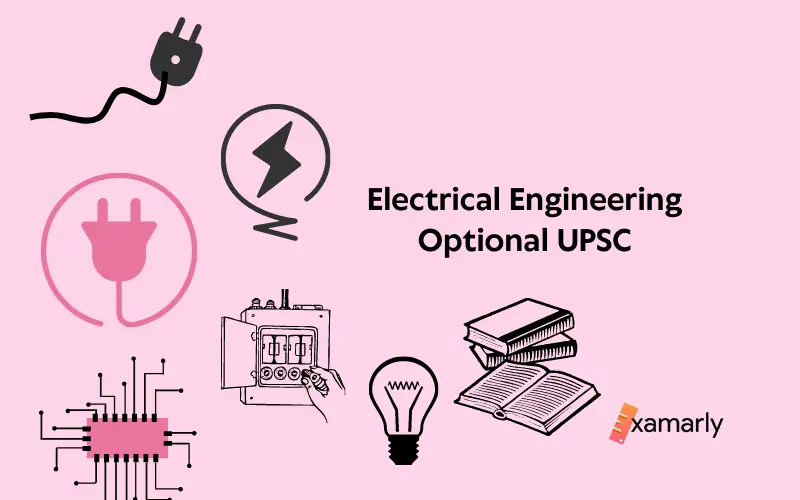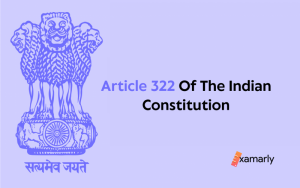Electrical Engineering is one of the most reputed branches. It has wide spectrum of jobs. But did you know that even in the most toughest exam of Indian which is UPSC, it is a very preferred optional. Let us get to know about all the doors it can open for one such aspirant having the same background.
Before you start studying for the Electrical Engineering Optional UPSC, you should know a few things. The first is that the subject is extremely easy and the questions that you are likely to see are pretty basic. There is very little variation in the type of questions asked from year to year. Another thing to remember is that the best way to prepare for this optional paper is to start early – 4-5 months before the exam.
- Introduction To The Subject
- Comparison/Similarity With Other Optional Papers
- Advantages Of Electrical Engineering Optional UPSC
- Disadvantages Of Electrical Engineering Optional UPSC
- Mastering The Subject From Basics
- Importance Of Academic Background
- What Time Duration Is Required For Preparation?
- Topic-Wise Weightage Of IAS (UPSC CSE) Electrical Engineering Optional
- Overlapping Syllabus with GS
- Help In Interview
- Recent Toppers Of UPSC CSE With Electric Engineering Optional
- Data/Scores Available
- Electrical Engineering UPSC Optional Preparation Strategy
- Standard References
- Conclusion
- FAQs
Introduction To The Subject
The syllabus for Electrical Engineering, one of the 48 optional disciplines on the UPSC list, is centred on candidates’ comprehension of fundamental ideas and knowledge acquisition. This subject’s themes cover power systems, microprocessors, analogue and digital electronics, etc.
To prepare for the IAS Exam effortlessly, candidates should select Electrical Engineering as an optional subject when they have a strong interest and background in the field.
There aren’t many aspirants who take mechanical engineering, electrical engineering as an optional subject for the UPSC exam, although people who are also gearing up for the IES examination often do so. The applicants should concentrate on establishing a very good approach because the syllabus is extensive and they want to cover it completely.
Comparison/Similarity With Other Optional Papers
Electrical engineering is a highly specialized subject. For this reason, it is highly recommended for graduates who have studied this take it up as an optional paper in the mains exam. This subject comes with its advantages and disadvantages, so it is important to consider your strengths and match them to what the subject demands. It will not be too difficult to complete the syllabus if you have a background in electrical engineering.
Advantages Of Electrical Engineering Optional UPSC
- Someone who has studied this subject at the level of graduation wouldn’t have to start all over because they’ll be familiar with the concepts and subject matter beforehand.
- It is technical and hence marks received in this paper are well compared with humanities subjects. In comparison to the humanities optional subjects that require interpretation, there is no space for interpretation in this subject.
- Diagrams, circuits, flowcharts, and numbers can all fetch good marks.
- As long as you write clearly and correctly, this topic even has a theory component that can be scored.
- On average, 50% of the IAS exam’s questions are repeated. Additionally, the questions are straightforward. You should be able to earn respectable grades with diligent practice and clear mental understanding. As a result, the questions can be predicted easily, and the difficulty level is never extremely high.
See Also – Medical Science Optional For UPSC
Disadvantages Of Electrical Engineering Optional UPSC
- Aspirants must put in a great deal of work because the discipline is challenging. Much practice is required, especially with numbers.
- Electrical engineering has a very extensive course curriculum.
- There is no overlap with the general studies Paper.
- Aspirants are advised to abstain from selecting this optional and are rather advised to choose a subject with high GS overlap unless someone is an expert in this subject and has studied it at the level of graduation.
Mastering The Subject From Basics
To score well in UPSC CSE electrical optional, it is important to know the basics of this subject. Students must start by studying basic NECRT physics and electrical topics from the various books available. Then, they must choose an appropriate textbook for this optional subject. You can find some of the best reference books in the market.
A complete understanding of the syllabus is essential to score well in Electrical Engineering. It is also a good idea to prepare for this optional subject by solving the previous year question papers. This will help you analyze which topics have the highest number of questions and boost your preparation strategy.
You Might Also Like – Government Jobs For Electrical Engineers – Latest Update And Job Alert 2022
Importance Of Academic Background
In selecting your optional subjects, it is important to know your interests. You should select a subject you are interested in and that you can easily learn without getting bored. The syllabus and content of your chosen optional subject should be based on your academic background and your comfort level in reading the subject. There are many other factors to consider while selecting an optional subject.
The academic background is very important for those who are considering opting for electrical engineering as their optional subject in the UPSC mains examination. This subject involves a lot of problem-solving and requires more time than the GS syllabus. However, it is highly rewarding and can provide an interesting change from the routine GS preparation.
What Time Duration Is Required For Preparation?
The syllabus for the electrical engineering optional paper is huge and requires a lot of preparation. Hence, it is essential to set up a daily study schedule and try to cover as much as possible in a limited time. The best way to prepare for electrical engineering optional is to start as early as possible. You should make sure that you are studying for at least 4 to 5 months before the exam.
Unlike other subjects, the syllabus for the UPSC electrical engineering optional is fairly extensive. You will need to study a lot of books to master the material. In addition to the general syllabus, you’ll also have to study the subject’s application. In addition, electrical engineering is a highly specialized subject. For this reason, it is advisable for candidates who have graduated in electrical engineering to opt for this subject as an optional in the UPSC mains exam.
Topic-Wise Weightage Of IAS (UPSC CSE) Electrical Engineering Optional
The topic-wise weightage is essential for UPSC CSE Preparation. The following tabular will help you to decide which topic is more important and requires the utmost attention.
| Topics | 2015 | 2016 | 2017 | 2018 | 2019 |
|---|---|---|---|---|---|
| Control System | 70 | 67.5 | 90 | 100 | 100 |
| Power System | 80 | 70 | 85 | 95 | 80 |
| Digital Communication | 60 | 77.5 | 70 | 80 | 90 |
| Measurements and instrumentations | 70 | 65 | 95 | 60 | 50 |
| Energy Conversion | 100 | 60 | 50 | 60 | 60 |
| Circuit theory | 50 | 60 | 60 | 70 | 50 |
| Power Electronics and Electrical Drives | 60 | 60 | 40 | 70 | 40 |
| Microprocessor and Microcomputers | 60 | 60 | 50 | 50 | 50 |
| Analog Electronics | 40 | 60 | 50 | 50 | 60 |
| E.M. Theory | 30 | 60 | 50 | 50 | 50 |
| Analog Communication | 50 | 40 | 40 | 40 | 40 |
| Signal and System | 40 | 40 | 60 | 10 | 50 |
| Digital Electronics | 30 | 20 | 50 | 50 | 50 |
| Power System Protection | 60 | 60 | 20 | 20 | 30 |
Overlapping Syllabus with GS
This subject is often chosen by those with a strong electrical engineering understanding. The syllabus is vast and is often intimidating to aspirants who do not have a solid background in the subject. It is also separate from the General Studies paper, which makes it even more important to prepare for it thoroughly. It covers topics such as basic engineering and materials, mathematical and logical reasoning, and safety and quality practices.
Help In Interview
If you are preparing for the Electrical Engineering optional UPSC exam, here are some tips that will help you perform well in the interview. The first tip is to read up on the subject you’re preparing for. The questions they ask are generally pretty simple. You should also keep reading two or three newspapers a day and be familiar with the latest news and events.
After you have done your mains exam, it’s time to think about your optional subjects. Choose the ones that you think will be easy to score well on. For example, if you have a strong background in electrical engineering, you should opt for this subject. However, if you have no background in electrical engineering, you may want to choose civil engineering.
Recent Toppers Of UPSC CSE With Electric Engineering Optional
For the UPSC CSE Mains examination, somewhere between 100-150 candidates choose electrical engineering subject optional as their optional Subject. Rishi Raj, who chose electrical engineering as his optional subject, finished with the 27th AIR in the 2017 UPSC CSE examination. The number of individuals that took this optional and passed the IAS exam is shown in the given figure.
IAS Toppers Electrical Engineering Optional
| Name | Year | Rank |
| Rishi Raj | 2017 | 27 |
| Rushikesh Reddy | 2017 | 374 |
| Rahul Gupta | 2016 | 20 |
| Surabhi Gautam | 2016 | 50 |
| Ashish Kumar | 2014 | 9 |
| Mayank Agrawal | 2012 | 67 |
| Prakash Rajpurohit | 2009 | 2 |
| Mutyalaraju Revu | 2006 | 1 |
Data/Scores Available
Electrical Engineering Optional Success Rate
| Year | No. of candidates appeared | No. of candidates cleared | Success Rate (%) |
| 2017 | 193 | 19 | 9.8 |
| 2015 | 143 | 13 | 9.1 |
| 2014 | 192 | 15 | 7.8 |
| 2013 | 113 | 13 | 11.5 |
| 2012 | 126 | 8 | 6.3 |
| 2011 | 171 | 9 | 5.3 |
| 2010 | 132 | 7 | 5.3 |
Electrical Engineering UPSC Optional Preparation Strategy
- Because the syllabus is so extensive, you should never stray from it or read outside of it. As a result, keep a printed copy of the syllabus nearby at all times.
- At no point should you ignore quantitative matters. Along with the theory papers, solve it.
- Students must Solve the optional Civil Services and Engineering Services previous year Question Papers. Consult books from Made Easy Publication that are equally well-curated with mock test questions.
- Understand all the theory concepts thoroughly, as the exam may inquire about them.
- Due to the extensiveness of the syllabus, one should continue creating his/her notes that can be used for revision
Standard References
The syllabus for UPSC electrical engineering optional exam is vast. It deals with the study of electricity, electronics, and electromagnetism. While the subject has many branches, the key focus should be on building a solid foundation in these subjects. Though there are several electrical engineering books available in the market, not all of them are suitable for UPSC. However, the following books will be helpful for the candidates attempting this subject.
At the beginning of the UPSC CSE preparation, the following books will be very helpful. These books are available in both online and offline markets.
| Topics | Name of Books | Authors/ Publishers |
| Circuit Theory | Circuit Theory: Analysis And Synthesis | Abhijit Chakrabarti |
| Signal and System | Communication Systems | Sanjay Sharma |
| Signals and Systems | Alan V. Oppenheim, Alan V. Willsky, S. Hamid Nawab | |
| E. N. Theory | Principles of Electromagnetics | Mathew Sadiku |
| Electromagnetic Fields & Waves | K.D. Prasad | |
| Analog Electronics | Analog Electronics | J.B. Gupta |
| Digital Electronics | Digital Logic and Computer Design | M. Morris Mano |
| Energy Conversion | Energy Conversion | Ashfaq Hussain |
| Power Electronics and Electric Drives | Power Electronics | PS Bimbhra |
| Analog Communication & Digital Communication | Modern Digital and Analog Communication Systems | BP Lathi |
| Microprocessor and Microcomputers | Fundamentals of Microcontrollers and Applications in Embedded Systems | Ramesh Gaonkar |
| Measurements and Instrumentations | Measurements and Instrumentation | AK Sawhney |
Reference Books for Electrical Engineering Optional UPSC
Other than the above-mentioned, candidates can use these books as reference material:
- Principles of Electronics – V. K. Mehta
- An Introduction to Analog and Digital Communications by Simon Haykin
- Control Systems by A. Anand Kumar
- Radio Engineering – G.K. Mithal
- Elements of Engineering Electromagnetics – Nannapaneni Rao
- Electromagnetic Waves and Field – R.N. Singh
- Data Communications and Networking by Behrouz A. Forouzan
- Semiconductor – Nag Choudhary
- Signals and Systems by Ramesh Babu
- Signals and Systems by Alan V. Oppenheim
- Electromagnetic Theory by Bakshi
- Analog Electronics published by Godse and Bakshi
- Digital Electronics by Godse and Godse (Technical Publications)
- Electrical Power Systems by CL Wadhwa
- Physics of Semiconductor Devices – Simon Sze
- Circuit Analysis – Gupta Electrical Technology – Thareja
- Automatic Control System – Benjamin C. Kuo
- Control Systems Engineering – Nagrath Gopal
Conclusion
While the UPSC examination pattern has two optional papers for electrical engineering, the syllabus for the subject is a bit different from the other papers. It includes more theory and numerical questions and is considered to be a high-scoring option.
If you want to ace the electrical engineering optional for the UPSC exam, then you need to study the required material. The syllabus is vast, so you need to dedicate a lot of time to the subject. The best way to cover the syllabus in the allotted time is to follow a strict study schedule.
FAQs
Why Choose Electrical Engineering Optional UPSC CSE?
One of the most well-known optionals for the top 10 scorers is electrical engineering. This is because traditionally, applicants who excel in engineering will choose this optional topic. Additionally, despite the syllabus being somewhat lengthy comparable to other optional subjects, this is quite scoring.
The most significant arguments in favour of choosing this option is the ease with which you can pass the Engineering Service Exam by following the same preparedness as only the UPSC administers both exams.
Can I Take Electrical Engineering As An Optional Subject at UPSC?
One of the optional disciplines the UPSC offers for the Civil Service Mains Exam is electrical engineering. Civil and mechanical engineering are the other two engineering specialities. If you have previously studied it in college, you may choose it.
Is Electrical Engineering A Good Optional Subject for UPSC CSE?
One of the most popular engineering subjects optional for UPSC Mains is electrical engineering. Mechanical engineering, electrical engineering, and civil engineering are among the technical courses that UPSC offers as optional subjects.
Electrical Engineering Optional For UPSC CSE Examination Consists Of How Many Papers?
The UPSC test format for Electrical Engineering Optional includes two optional papers. Each paper has a maximum of 250 marks, for a total of 500 marks.






